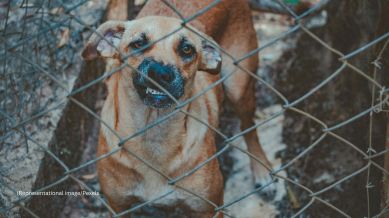Man bitten by rabid dog slits own throat, dies in Tamil Nadu hospital
The man began displaying severe aggression and unpredictable behaviour, characteristic symptoms of late-stage rabies.

On Tuesday, Ram Chander, a man from Odisha, slit his own throat at a government hospital in Coimbatore, Tamil Nadu, following a rabies infection. Chander worked at a private firm in Coimbatore and was bitten by a dog a few days ago.
According to an India Today report, Chander was kept in an isolation ward. As the disease spread, he began displaying severe aggression and unpredictable behaviour, characteristic symptoms of late-stage rabies. During his isolation, he broke a glass pane and used the glass pieces to slit his throat.
monthly limit of free stories.
with an Express account.
Recognising the risk of rabies transmission through bodily fluids, the hospital staff refrained from intervening right away, and notified the police. However, by the time officials arrived, the man lost a lot of blood and subsequently succumbed to injuries.
The police have registered a case in connection with the incident. Meanwhile, the viral footage of his tragic final moments has sparked conversations about the dangers of rabies and the critical importance of receiving timely vaccinations after animal bites.
According to the World Health Organisation (WHO), rabies is a viral, zoonotic disease that affects the central nervous system and can be prevented through vaccination. Dogs are responsible for transmitting the virus in about 99 per cent of human rabies cases, with children aged 5 to 14 being the most common victims. Rabies exists on every continent except Antarctica.
The disease spreads through saliva, typically from bites, scratches, or direct contact with mucous membranes such as the eyes, mouth, or open wounds. Once symptoms develop, rabies is nearly always fatal.